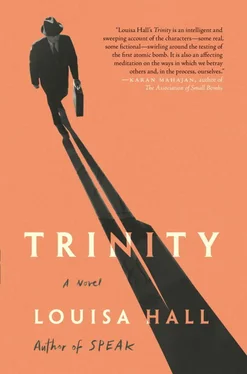He laughed, and said he remembered my parents and that mink coat, then invited me to his new office at the institute. He explained that it was a smaller office, on the second floor, to which he’d moved when he’d resigned the directorship. Then we scheduled the interview for a date in December, and once I’d hung up the phone, I arranged for my son to spend that night with our neighbor. Then I booked a flight to New York, and a local train ticket to Princeton.
Several weeks later, when I arrived at the new institute building, I found it deserted. Strangely, he’d invited me to come on a Sunday. So I let myself in, passed all the empty offices on the first floor, climbed the echoing stairway, and found his new office at the end of a dark hallway.
It was small and out of the way, unprotected by a secretary. There was no one there to protect him. And because he hadn’t heard my approach, I was able to stand in the doorway for a few moments, watching him before he became aware of my presence.
He was turned away from the desk, looking out toward the window, and I wondered if he’d posed himself in that contemplative position, anticipating my arrival, or whether I’d really caught him in an unguarded moment.
The window faced out toward the bare trees and the frozen pond where my sister and I used to ice-skate. Inside his office, there was no furniture except that big metal desk, which was bare, and a file cabinet in the corner. The only photograph on the wall was a single, framed picture of Kitty, which I observed with detachment.
When I saw her last, as a child in my parents’ house, I was sitting with my sister on the landing of the carpeted staircase, where we sat to observe our parents’ parties. Oppenheimer and Kitty came late. They’d only recently moved. She was beautiful, in her gleaming mink coat and her pearl necklace, and he was still the celebrity scientist he remained for several years after the war.
As the party progressed, however, it was clear that she’d had too much to drink. I watched her carefully from the stairwell. By then, I’d learned to immediately locate any potential sources of conflict. So I saw that, no matter where she stood in my parents’ living room, she was always watching her husband, and she was often alone, while he was generally surrounded by women.
He had a way of listening to them very intently, leaning forward with his silver cigarette lighter whenever they needed a light. He was courteous and attentive, and from wherever Kitty stood in that party, she watched him with her ravenous little face, occasionally touching the pearls at her throat.
At some point, as he occasionally did when he’d been drinking, our father called our mother to play the piano. Then she sat, and played with her head down, her dark hair drawn up so the vulnerable back of her neck was revealed.
Kitty stood alone in the corner, sucking down the last of her drink. She was swaying lightly in her black pumps. Throughout the whole piece, she watched her husband, and in the silence that opened when the music had stopped, she suddenly lurched forward and said, “Robert, I love you.”
Everyone froze. On the landing, I reached for my sister’s hand. In her forward lurch, Kitty had wanted to reach him, but her heel caught on the carpet, so instead of finding his arm, she fell into one of the women who’d gathered around him.
And even so, she didn’t take her eyes off her husband. Getting set straight by that woman, she was still looking up at her husband, and finally he turned his attention to her.
For a moment, he watched her struggle in that woman’s arms with the same courteous intensity he’d formerly turned on the women who gathered around him.
A moment passed before he himself took her.
Then, patiently, he gathered her up from that other woman, offered his general regrets, helped her into her coat, and guided her gently out of the party.
AND THERE SHE WAS AGAIN, WHEN I CAME BACK TO PRINCETON INDecember of 1966: the only photograph on a blank wall.
In the picture, she was riding a horse, heading off toward a jump. Her body was lifted slightly out of the saddle and leaning in toward the upcoming fence. She was wearing jodhpurs and boots, and her riding hat covered most of her face.
For some reason, I was glad for her that this was the only image he’d kept: not her falling forward, her heel caught on the carpet, but her riding off, away from us all, most of her expression kept secret.
OPPENHEIMER STILL HADN’T NOTICED MY PRESENCE. HE FACED THEfrozen pond and the stripped trees that huddled unhappily around its circumference, and from behind, his neck looked very frail. The collar of his shirt circled it loosely. His hair was a white mist over his skull, and his hand, resting on his knee, was a collection of bones, numbered and arranged on the dark wool of his trousers.
I wondered, then, why he’d invited me to come on a Sunday, when the building was otherwise empty. When there would be no witnesses if I made an interrogation room of that office.
I looked at him more closely. He was dying; that much I could see. I knew that he deserved mercy, but when he finally noticed me and invited me in, I crossed the threshold with brutality in my heart, and as he watched me pull out my tape recorder and unravel its cords, his eyes—gray and intent under those disheveled white eyebrows—reminded me of a dog’s eyes.
They also reminded me of my husband’s.
ONCE WE STARTED TALKING, IT TOOK LITTLE TO PROMPT HIM TOcontinue. One question led to many answers. Often he returned to the subject of physics. He stressed what that new science had meant to him as a young man: the great shift in his mind-set that it had produced, to understand that any given entity can only be defined as a function of its observer. To come to the realization that the very aim of understanding an individual unit might be inherently impossible.
It had alleviated, he told me, his loneliness. It had caused him to understand that he could only ever know himself as part of a system.
As a young man, he was saying, he’d immediately understood the new physics to be less in line with Western religion than it was with philosophies from the East, in which the immeasurable was regarded as the primary reality.
In Sanskrit, he said, the root for the verb to measure was the same as the root for illusion . The truth of this relation, he said, had been demonstrated by quantum theory. To measure any aspect of the world, he said, was to pull an individual unit apart from the whole flow of a system, a flow of which that individual unit was an integral part, and which defined that individual unit as integrally as its own characteristics.
Explaining this, he spoke very quietly, but he continued to engage me with his gray, doglike eyes, keeping them fixed on my face, so that I couldn’t help but acknowledge them. Even if I looked away, I eventually felt compelled to return my gaze to meet his.
My husband’s eyes were the same. They were just as insistent, although his, unlike Oppenheimer’s, were brown. But at that time of my life, even when I wasn’t with him, they were always perfectly clear in my mind, so that my thoughts returned to them often, in the grocery store, or while driving, or while interviewing Oppenheimer in his new office.
Sitting opposite Oppenheimer, I thought of the adage everyone knows, about how the eyes are the windows to a person’s soul. I wasn’t sure that expression was right. Of all the people I’d tried to know in my life, I knew my husband least, and he was the one whose eyes I’d most determinedly studied.
It was a painful thought, which occurred to me while Oppenheimer was talking about the impossibility of knowing everything about any particle in isolation, and in order to distract myself, I glanced up again at that picture of Kitty.
Читать дальше












